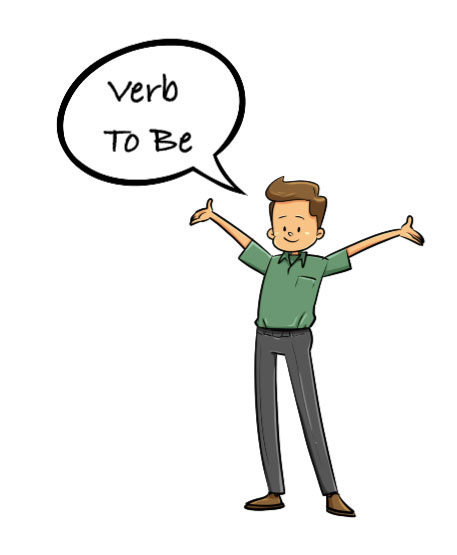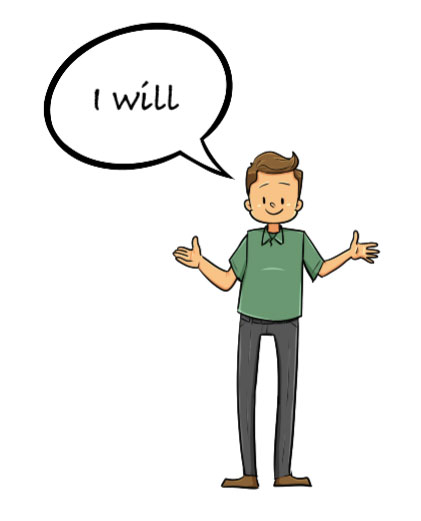El verbo TO BE
Los dos verbos ingleses más importantes son to have (haber o tener) y to be (ser o estar).
Para evitarse confusiones, hasta ahora le hemos enseñado el verbo to be como si significara solamente estar, pero como este verbo significa también SER, vamos a estudiarlo ahora con sus dos significados.

TIEMPO PRESENTE DE TO BE
I am (ai am) – Yo soy, Yo estoy
You are (yuu aR) – Usted es, Usted está
You are (yuu aR) – Ustedes son, Ustedes están
We are (uí aR) – Nosotros (as) somos, Nosotros estamos They are (déi aR) – Ellos (ellas) son, Ellos (ellas) están He is (jíi is) – El es, El está
She is (SHíi is) –Ella es, Ella está
It is (it is) – El (ella) es, El (ella) está (neutro)
Estudie cuidadosamente las frases siguientes:
She is angry – Ella está enojada They are feeble – Ellas son débiles He is very good – El es muy bueno I am happy – Yo soy feliz
He is very healthy – El es muy sano
I am ill – Yo estoy enfermo
She is very kind – Ella es muy bondadosa
He is very old – El es muy viejo
I am poor – Yo soy pobre
They are very sad – Ellos están muy tristes
He is very strong – El es muy fuerte
She is very young – Ella es muy joven
He is an able man – El es un hombre hábil They are in the house – Ellos están en la casa He is English – El es inglés
EL PASADO DEL VERBO TO BE
Para conocer el pasado del verbo «to have» necesita recordar las palabras: was y were.
Con sólo esas dos palabras se tiene todo lo que se necesita saber para conjugar el pasado de to be!!!
Was (uós) se usa con yo, él y ella.
Were (uéeR) con nosotros, usted, ustedes y ellos.
El estudiante dominará fácilmente el pasado de to be si no olvida el hecho de que son necesarias sólo dos palabras inglesas para cubrir las numerosas, diferentes e indispensables en la conjugación del pasado de los verbos castellanos ser y estar.
EJEMPLOS
I was (ai uós) – Yo era, fui; estaba, estuve
You were (yuu uéeR) – Usted era, fue; estaba, estuvo
You were (yuu uéeR) – Ustedes eran, fueron; estaban, estuvieron We were (uí uéeR) – Nosotros éramos, fuimos; estábamos, estuvimos They were (déi uéeR) – Ellos eran, fueron; estaban, estuvieron
He was (jíi uós) – El era, fue; estaba, estuvo
She was (SHíi uós) – Ella era, fue; estaba, estuvo
It was (it uós) – Era, fue; estaba, estuvo (neutro)
Estudie las frases siguientes:
She was in the garden – Ella estaba en el jardín
I was in bed – Yo estaba en cama
He was a good painter – El era un buen pintor
We were in London (Lóndon) – Nosotros estuvimos en Londres
You were wrong – Usted estaba equivocado

EL FUTURO DE TO BE
Solo debe agregar la palabra «will»:
I will be (ai uíl bíi) – Yo seré o estaré
You will be (yuu uíl bíi) – Usted será o estará You will be (yuu uíl bíi) – Ustedes serán o estarán He will be (jíi uíl bíi) – El será o estará
She will be (SHíi uíl bíi) – Ella será o estará
It will be (it uíl bíi) – Será o estará (neutro)
We will be (uí uíl bíi) – Nosotros seremos o estaremos
They will be (déi uíl bíi) – Ellos serán o estarán
EJEMPLOS
He will be here to-night – El estará aquí esta noche
I will be there to-morrow – Yo estaré allí mañana
I will be here all the morning – Yo estaré aquí toda la mañana
He will be in that boat – El estará en ese bote
WOULD BE
I would be (ai uúd bíi) – Yo sería o estaría
You would be (yuu uúd bíi) – Usted sería o estaría You would be (yuu uúd bíi) – Ustedes serían o estarían He would be (jíi uúd bíi) – El sería o estaría
She would be (SHii uúd bíi) – Ella sería o estaría
It would be (it uúd bíi) – Sería o estaría (neutro)
We would be (uí uúd bíi) – Nosotros seríamos o estaríamos
They would be (déi uúd bíi) – Ellos serían o estarían
EJEMPLOS
I would go in the morning – Yo iría en la mañana
He would say that – El diría eso
They would be in London – Ellos estarían en Londres
They would be tired – Ellos estarían cansados
MAY BE
I may be (ai méi bíi) – Yo puedo ser o estar
You may be (yuu méi bíi) – Usted puede ser o estar You may be (yuu méi bíi) – Ustedes pueden ser o estar He may be (jíi méi bíi) – El puede ser o estar
She may be (SHíi méi bíi) – Ella puede ser o estar
It may be (it méi bíi) – Puede ser o estar
We may be (uí méi bíi) – Nosotros podemos ser o estar
They may be (déi méi bíi) – Ellos pueden ser o estar
EJEMPLOS
They may be here tomorrow – Ellos pueden estar aquí mañana
I may be in London this winter – Yo puedo estar en Londres este invierno
He may be ill – El puede estar enfermo
You may be wrong – Usted puede estar equivocado
MIGHT BE
I might be (ai mait bíi) – Yo podría ser o estar
You might be (yuu máit bíi) – Usted podría ser o estar You might be (yuu máit bíi) – Ustedes podrían ser o estar He might be (jíi máit bíi) – El podría ser o estar
She might be (SHíi máit bíi) – Ella podría ser o estar
It might be (it máit bíi) – Podría ser o estar
We might be (uí máit bíi) – Nosotros podríamos ser o estar
They might be (déi máit bíi) – Ellos podrían ser o estar
EJEMPLOS
He might be in Mexico – El podría estar en México
She might be there – Ella podría estar allá
He might be in that room – El podría estar en esa pieza
They might be doing that – Ellos podrían estar haciendo eso
IF I WERE
If I were (if ái uéeR) – Si yo fuera o estuviera
If you were (if yuu uéeR) – Si usted fuera o estuviera
If you were (if yuu uéeR) – Si ustedes fueran o estuvieran
If he were (if jíi uéeR) – Si él fuera o estuviera
If she were (if SHíi uéeR) – Si ella fuera o estuviera
If it were (if if uéeR) – Si fuera o estuviera (neutro)
If we were (if uí uéeR) – Si nosotros fueramos o estuviéramos
If they were (if déi uéeR) – Si ellos fueran o estuvieran
EJEMPLOS
If I were ill I would be in bed – Si yo estuviera enfermo yo estaría en cama
If he were here he would be angry – Si él estuviera aquí él estaría enojado
